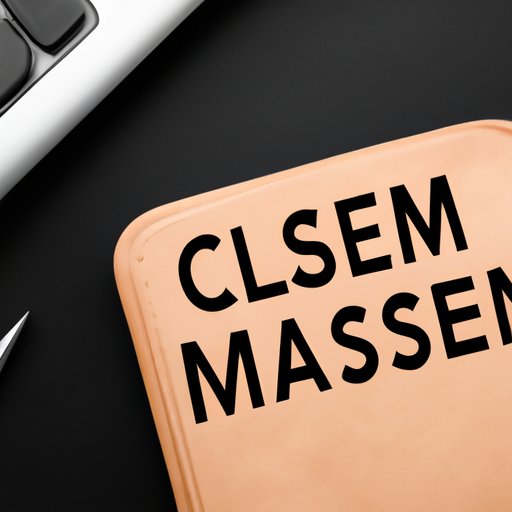
Introduction
Legal proceedings can be intimidating and confusing, especially for those who have never dealt with the judicial system before. One aspect of the legal system that people may not be familiar with is the case management conference. In this article, we’ll explore what a case management conference is, who participates in it, and why it’s critical to the legal process.

Everything You Need to Know About Case Management Conferences
A case management conference is a meeting between the parties involved in a lawsuit to help manage the case more effectively. It’s an opportunity to discuss the legal matter at hand and ensure that all parties are on the same page moving forward.
The conference is typically held in a courtroom or in a conference room at the courthouse and the judge presides over it. In some cases, a court officer or a clerk may oversee the conference.
The participants in a case management conference can vary depending on the case, but typically include the following:
- Plaintiff(s)
- Defendant(s)
- Attorneys for both parties
- Judge or court officer
The conference may take place at different points in the case, but typically occurs after the initial pleadings have been filed and before any significant action (such as discovery or trial) takes place.
Navigating the Legal System: Understanding Case Management Conferences
Case management conferences are a crucial part of the legal system and can be particularly helpful in managing complex and lengthy trials.
While the conference may be similar to other court hearings, it is far more informal than a traditional court hearing. The goal is to help manage the case effectively and ensure that everyone involved is moving forward with the same understanding.
The Purpose and Benefits of a Case Management Conference
The primary goal of a case management conference is to help manage the case and keep it on track. Some specific purposes include:
- Identifying the issues in the case
- Streamlining the discovery process
- Assisting with settlement negotiations
- Simplifying the trial process
There are many benefits to participating in a case management conference. By discussing the case openly, all parties involved can get a better understanding of the strengths and weaknesses of their legal arguments. Parties may also be able to identify potential issues or roadblocks before they arise and can work together to resolve them.
How to Prepare for Your Case Management Conference
Preparing for a case management conference is critical to ensuring that you get the most out of it. Here are some steps to help you prepare:
- Review the pleadings, motions, and other documents in the case
- Consider any potential issues that could arise and brainstorm possible solutions
- Prepare any documentation or exhibits that may be needed for the conference
- Review the agenda and be prepared to discuss any relevant topics
During the conference, it’s important to communicate your perspectives effectively. Be sure to listen carefully to the other parties and the judge, and ask any questions that you may have. Always be professional and courteous, and avoid getting emotional or confrontational.
A Step-by-Step Guide to the Case Management Conference Process
While each case management conference may be slightly different, here are some of the key steps that are typically taken:
- Opening statements from the judge or court officer, outlining the purpose of the conference and the agenda
- Discussion of the issues in the case, including all potential legal claims and defenses
- Review of the discovery process and any necessary deadlines that need to be met
- Identification of any potential settlement opportunities and exploration of settlement options
- Scheduling of any needed pretrial proceedings, such as depositions or expert testimony
- Setting the dates for future conferences or trial dates, if necessary
Exploring the Role of Case Management Conferences in Civil Litigation
Case management conferences play an important role in civil litigation. One way in which they can impact the outcome of a case is by helping to move it along more efficiently. By identifying potential roadblocks and resolving them early on, case management conferences can help expedite the litigation process, potentially saving parties time and money.
Further, case management conferences can help to establish better relationships and collaboration between the parties involved. This can be particularly helpful in cases where there is significant hostility between the parties, or where there are complex legal issues that require cooperation to resolve.
Maximizing the Outcome of Your Case: Leveraging the Potential of the Case Management Conference
Parties can improve their chances of achieving a favorable outcome in their case by leveraging the potential of the case management conference. Here are some strategies to consider:
- Be prepared: Review your case documents and be ready to discuss all relevant issues
- Be collaborative: Work with the other parties to identify solutions to any issues that arise
- Be strategic: Use the conference as an opportunity to establish your legal arguments and demonstrate the strength of your case
By following these strategies, you can help to ensure that your case management conference is productive and effective.
Conclusion
Case management conferences can seem intimidating, but they serve an important purpose in the legal system. By working collaboratively with the other parties involved, parties can use the conference to streamline the legal process and achieve better outcomes in their cases. Follow these tips to prepare for your case management conference, and don’t forget to be professional, courteous, and strategic throughout the process.




